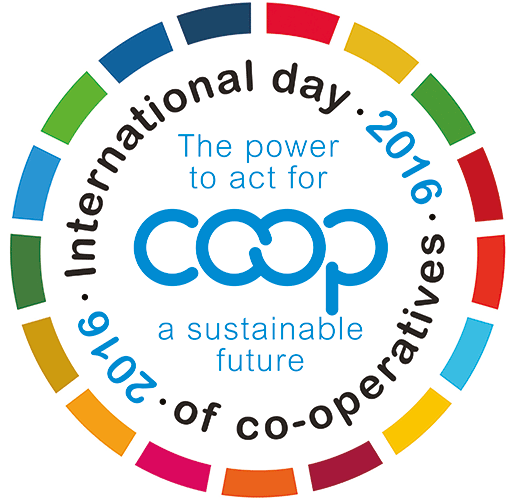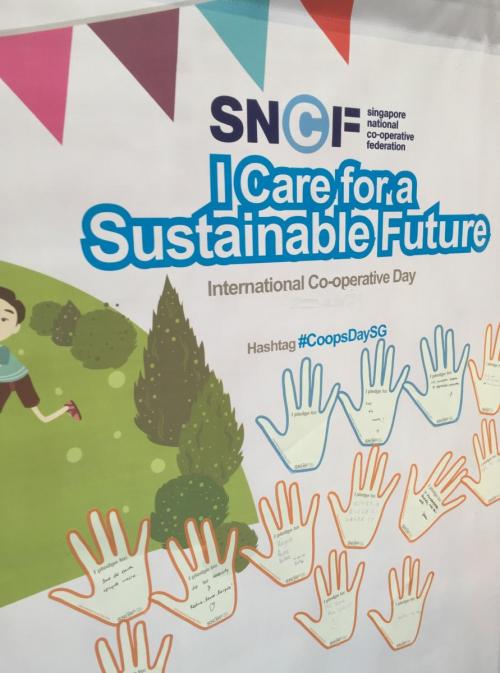2016 International Cooperative Day

The slogan for the 2016 International Day of Co-operatives and Year is ‘Co-operatives: The power to act for a sustainable future’. The slogan was chosen to emphasize the co-operative contribution to the United Nations' Sustainable Development goals, or SDGs. Co-operatives are important partners to achieve the SDGs, because they foster democracy, practice social inclusion and operate with concern for the environment, all while having a significant economic impact on the world economy.
The Alliance called on co-operators worldwide to celebrate the Day and show how co-operative principles and values act in support of the SDGs. Many countries in the Asia Pacific region celebrated the Day with great enthusiasm and fervor. The below is an account of celebrations from a few countries,

The Singapore National Cooperative Federation (SNCF) celebrated the Day with the public at AMK Mall through a roadshow that showcased contributions of local co-operatives to Singapore’s economic and social development. This was presented in the form of visual exhibits that illustrated Singapore’s co-operative milestones and highlighted prominent social needs which gave rise to different co-operatives over the past decades. In line with this year’s theme, SNCF invited participation from the public to show their support in working towards a sustainable future for Singapore by pledging their commitment for a sustainable future in the form of the handprints which are featured on the commitment wall (refer to attached photo). More information can be found at SNCF’s Facebook on https://www.facebook.com/sncf.singapore/.
In Kathmandu, Nepal, cooperative activists and stakeholders marked the 94th International Day of Cooperatives across the country by forming human-chain along the East-West Highway and other major national highways, including the ring-road in the capital, and by hoisting cooperative flags. According to National Cooperative Federation of Nepal (NCF/N), the umbrella organization of cooperatives in Nepal, millions of cooperators gathered together to mark the Day despite heavy rains. Shedding light on the significance of making the human chain, Mr. Keshav Badal, chairman of NCF, said that, “the human-chain would help build connectivity and networking among the cooperatives and their members. It was also a commitment to make our cooperatives strong, inclusive, environment-friendly and a major force of economic transformation in the community,” he said.
President Maithripala Sirisena of Sri Lanka at the celebration of International Day of Co-operatives
In Sri Lanka, His Excellency President Maithripala Sirisena of Sri Lanka joined cooperators in celebrating the Day at the Nelum Pokuna theatre. President Sirisena, addressing the event said that himself being a cooperative employee at one time, is now proud to see the sector’s performance and role in Sri Lanka’s economy. He said it is time to introduce a Legislative Act to strengthen the sector, which has contributed to the country’s economy with a total value close to US$ 3 billion. Minister of Industry and Commerce Rishad Bathiudeen, addressing the event said as Sri Lanka’s third economic force cooperatives are set to enter the next stage of development with a variety of support measures from the government including a setting up of a cooperative university. He add, cooperatives helps us to achieve the Sustainable Development Goals. In this background I am pleased of International Cooperative Alliance’ support extended early this week to UN’s 2030 Agenda for Sustainable Development.
Centenary Celebration of Thailand Cooperative Movement and the 94th International Cooperative Day Celebration, in Bangkok, Thailand
A regional seminar on “COOP: Building a Better World” was organized by the Cooperative League of Thailand (CLT), and the Cooperative Promotion Department (CPD), Ministry of Agriculture and Cooperatives, Royal Government of Thailand, in collaboration with the International Cooperative Alliance, Asia and Pacific (ICA-AP), on the occasion of Centenary Celebration of Thailand Cooperative Movement and the 94th International Cooperative Day Celebration, in Bangkok, Thailand, during 4-8 July 2016. 46 delegates from Bhutan, China, India, Japan, Korea, Malaysia, Nepal, Philippines, Singapore, Vietnam and more than 125 delegates from Thailand attended the event. The program was inaugurated by Mr. Theeraphat Prayurasiddthi, Permanent Secretary, Ministry of Agriculture and Cooperatives, Royal Government of Thailand. Dr. Kouk Donsamran, Chairman of CLT, presented a report on the Thai Cooperative Movement. The two keynote speeches were delivered by Mr. Li Chunsheng, President of ICA-AP, on COOP: Building a Better World and by Dr. Kriengsak Chareonwongsak on “Centenary of Thai Cooperatives and UN SDGs. Mr. Balu Iyer, Regional Director, ICA-AP introduced the ICA Vision of 2020.
In India, the National Cooperative Union of India organized two events, a Symposium on the theme and a painting contest for children. The Chief Guest of the function was H.E. Mr. J. Goburdhun, High Commissioner of Mauritius High Commission New Delhi and the keynote speaker, Shri Subhash Palekar – an eminent Agricultural Scientist, Writer and Farmer from Amravati, Maharashtra. Shri. Palekar in his address said that cooperatives should come up in the field of ‘zero-budget farming’ so that it can be popularized through its wide network and reach. He said this natural way of farming can revolutionize Indian agriculture leading to increase productivity without dependence. Mr. Palekar further drew attention of the audience towards the rising number of farmer suicides in the country. He said despite government promises and financial assistance, the suicides of the farmers continued. He called upon cooperatives to establish direct links with the agricultural producers so that there is no dependence on money-lenders. Mr. Goburdhan, extolled the virtues of zero-budget farming in Mauritius in increasing agricultural production without any investment. He called upon the representatives of the cooperative sector present on the occasion to adopt this practice in the agricultural operations. He felt that this can be a great boon for the welfare of the Indian farming community. Over 100 children in the age group 6-15 participated in the painting contest. The theme this year was - Agriculture / Farming Area / Nature /Environment / People/Family. A participation certificate and a gift were given to all the participated children. All the paintings of the children will be sent to IE-No-HIKARI Association of Japan for 24th Annual World Children's Picture Contest.
In Australia, International Cooperative Day coincided with Federal election day. Members were asked to celebrate the Day by engaging in a variety of events. By hosting a story on their website and using the logo to spread awareness; reminding customers on 2 July that they were shopping at a co-op; and engaging in the global conversation via social media using the #coopsday and tagging @icacoop on 2 July - all day.
In New Zealand, Cooperative Business New Zealand (NZ.Coop) put out a media release highlighting the role of cooperatives in achieving the Sustainable Development Goals. The media release in part reads, “As a member of ICA, Cooperative Business NZ fully supports the initiative. We encourage Kiwi co-operative organisations to reflect upon the co-operative business model of 100% Member ownership and sustainability, the latter extending towards sustainable economic, social and environmental development. All of these goals are relevant to NZ as a country and New Zealanders as people. New Zealand’s co-operatives are key partners for achieving the agenda for Sustainable Development. We foster democracy, equality, social inclusion and we operate with concern for the environment via our principles we are sustainable and inclusive businesses and organizations. We foster job security, decent working conditions and promote community investment.”



